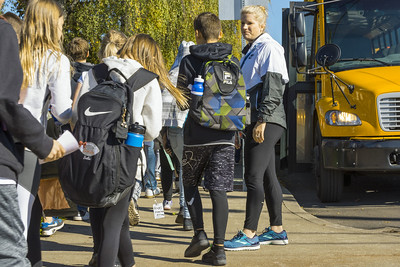By Kelsey Hearns
In today’s world, a college student would not suspect pain from the one thing that gets them through the school day, yet this is unfortunately the case.
From a young age, students have used backpacks as a functional way to carry their items; however, this can impact one’s physical health over time.
The double-strapped bag is meant to support the upper back, yet students are having to endure pain in all areas of the shoulders and neck.
Dr. William Beasley, a chiropractic physician and owner of Coastline Spine Chiropractic & Rehab in St. Augustine, says he has treated patients for backpack-induced pain.
“I have treated numerous patients complaining of back pain due to backpacks. Their ages range from approximately 10 to 22 years old,” Beasley said. “There are multiple ways a backpack could negatively impact a college student’s musculoskeletal system.”

A heavy load of binders, notebooks, and textbooks takes a toll on the back, especially after years of this pressure.
Beasley recommends college students avoid backpacks altogether, considering they are not packed or worn correctly.
“Backpacks weighing more than 15% of a person’s total body mass can be linked to upper and lower back pain when carried for an extended period of time,” Beasley said. “Not keeping the straps short and tight, wearing only one strap, wearing a bag with thin straps or wearing a backpack without a strap around the hips are no-no’s.”
If institutions replaced physical course materials and textbooks with electronic versions, the issue would lessen, prove cost-effective and be helpful to the environment.
Fortunately, the use of backpacks is diminishing, with technological advancements making it more convenient to carry less.
At Flagler College, using a tote bag instead of a backpack is the leading option, as students no longer carry anything more than a laptop.
Amber Bixby, an English major at Flagler College, has used a tote bag throughout her college career and finds no need for a backpack.
“If I don’t need that much, there’s no sense in carrying around an entire backpack,” Bixby said. “A tote bag is more of a facilitator I’d say.”
The senior started out wearing a backpack but quickly made the transition as its heavy weight became too much on her shoulders.
Tote bags are a conventional alternative to backpacks, although they are not suitable for everyone.
The downside of tote bags, for example, is that they are not waterproof and give easier access for others to take your belongings.
“If you get rained on, your stuff is not protected,” Bixby said. “You could also get stolen from easier with a tote bag instead of a backpack.”
Nevertheless, Bixby enjoys wearing a tote bag, as it allows for creative expression and a sense of identity with a blank canvas.
On the contrary, Zoe Kieffer, a coastal environmental science major at Flagler College, wears a backpack despite seeking chiropractic care in middle school from back pain.
“Wearing my backpack on only one side was one of the things contributing to my back pain,” Kieffer said. “My chiropractor actually said that was something common for people my age.”
Since Kieffer faced discomfort from wearing her backpack the wrong way as a child, she now stresses the importance of its proper positioning.
“If you wear a backpack properly on both sides and are mindful of how much you put in it, you’ll have less problems,” Kieffer said. “It’s the most convenient way to get your stuff around.”
Monitoring the weight of a backpack will help lighten the load and counteract health concerns for busy college students.
Whether students prefer to wear a backpack or tote bag, Kieffer emphasizes preventing physical stress on the back should be the main priority as they walk to class each day.
“Why did we have to bully society out of rolling backpacks?” Kieffer asked.



Be the first to comment on "The health impacts of backpacks on college students"